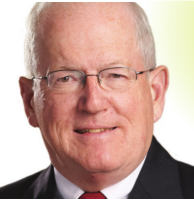Remembering the Senate president who got things done
Former New Hampshire Senate President Edward Dupont died in late February, after an extended battle with dementia. Dupont, a native of Rochester and later resident of Durham, was a fixture in New Hampshire public life for decades, starting as a businessman running Strafford Fuels, then serving in the Senate, running for the GOP nomination for governor, a race won by Steve Merrill, and finally running a prominent legislative counsel firm in Concord.
Dupont, a UNH dropout who had a lifelong interest in education but inconsistent performance as a student, was a trustee of the university system and chaired its board. That later was rectified with an honorary degree which recognized his service to the institutions and the state.
During his race for governor, this writer supported Dupont, the more moderate choice, and got to be friends with him. He was bright, friendly, proper and principled, and would have been a good governor.
As Senate President, he led the body well, formed coalitions and got things done.
His battle with Alzheimer’s disease was distressing for his family and friends. His passing, as those of many other leaders, reminds us of the passing of time and the brief period we have here to make a difference. Ed did.
During a recent presentation to the Leadership Manchester class’s Government and Politics Day at the State House, Democratic House Leader Matt Wilhelm told the class that he was proposing a bipartisan commission to study the pay for state legislators. His theory is that such a commission can set the compensation level at a fair amount. Each solon currently gets $100 a year plus mileage. The speaker and the Senate president get $150 a year.
Wilhelm’s suggestion is the latest round in a debate that has been going on ever since I can remember and calls into focus a debate about what kind of legislature we have and want. With 400 members in the House and 24 in the Senate, New Hampshire has the largest state legislature in the country. Given the rate of pay, members basically are volunteers.
The present size of the Legislature is the result of the constitutional system established in the 1700s, which called for one member of the House to be elected from each community, and one to be added for each 1,000 voters added to the population of a community. As the state grew, so did the Legislature until, with 420 members, the House chamber was full, and they rounded the number down to 400.
While this seems like a silly reason to have so many members, the theory behind it is that, as “the people’s House,” it is to represent the population, and having many members elected from relatively small districts accomplishes that goal.
Wilhelm’s proposal calls all of that into question. Is a House that large really more representative? Would raising the pay of legislators substantially so that the members become “professional legislators” attract a higher-quality legislature? Should the Senate be increased in size at the same time? These questions have come up again and again.
In a later encounter with Wilhelm, who was walking our neighborhood with his daughter and dog, he asked me what I thought about his proposal. My response was that, when I was his age, I probably would have proposed increasing the size of the Senate, decreasing the size of the House, and raising the pay of the legislators. Over time, however, watching the volunteer legislature in action, and realizing that New Hampshire is never going to raise the pay to a realistic amount on which someone could live, I have come to the belief that our legislators generally do a good job, we get far better representation than we might expect electing volunteers (although there are notable exceptions), and I suspect the quality of officials would go down if we elected people who ran just to make the $5,000 to $10,000 per year a commission might suggest.
He listened politely, and I bet will continue to press the idea of such a commission. To his credit, a serious examination of these questions from time to time probably helps the process and confirms the wisdom of what we have, or gives the people the chance to change it.
Brad Cook is a Manchester attorney. The views expressed in this column are his own. He can be reached at bradfordcook01@gmail.com.